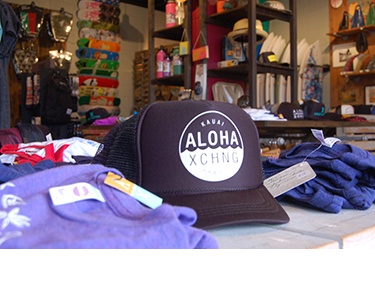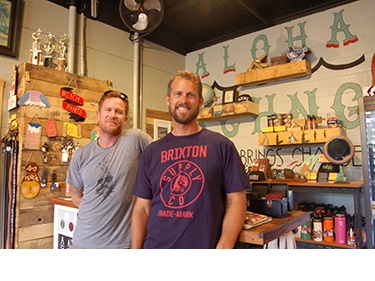Exchanging aloha
KALAHEO — There is not much that Jerimiah “Jamie” Dillberg and Nathan “Sparki” Metzger have not done.
Both men were raised into surfing families, who brought them out onto the ocean to learn the trade at an early age, and later became team riders for different surf brands.
Then, as they grew older, Metzger and Dillberg became businessmen on their own terms.
Rather than choosing to sit behind a desk and chase their dreams on their spare time, the two men opened up Kauai Surf School in 1999 on the island’s South Shore, where they have shared their passion for surfing with anyone willing to learn.
But up until a year ago, there was one thing that Dillberg, 39, and Metzger, 38, had not crossed off their to-do list: open up their own lifestyle store.
It was a business progression that, Dillberg said, only seemed natural since both had their own experiences in surf retail.
Dillberg, who began in retail when he was 13 years old, has done it all, ranging from managing a store team and owning Famous, his own surf accessories company.
Metzger, meanwhile, started his own T-shirt line, Pineapple Head, with his brother-in-law three years ago.
“There’s already different products that we’ve done production on, so it’s an easy, natural progression,” Dillberg said.
So when Metzger found a space in Kalaheo for his wife’s business, Kauai UnderGround Artists, he also discovered something else in the same building: a bare, 800-square-foot space that had potential.
With a bit of elbow grease and some help from their friends, Metzger and Dillberg opened up Aloha Exchange nearly a year ago.
Since then, their surf lifestyle store, 2-2535 Kaumualii Highway, has grown into a thriving business that offers high-quality apparel and accessories from more than a dozen local designers.
“We kind of just had the opportunity to have an office for our surf school … and do something that wasn’t so much visitor-oriented and something a little more community-oriented and also be in the genre that we love, which is surfing and skateboarding,” Dillberg said.
To commemorate the store’s one year anniversary, Metzger and Dillberg said they will hold a party on June 21 in the Aloha Exchange parking lot, featuring live music and food from local vendors.
The Garden Island caught up with Metzger and Dillberg on Thursday at their store, where they talked about their accomplishments and challenges in building their business over the past year.
TGI: How did you come up with the idea for the store’s name: Aloha Exchange?
Metzger: That originated from a sticker and shirt that we did with “Aloha Exchange” on it. We kind of come up with funny stuff like our “Lihue Vuitton” hats, so when I came up with “Aloha Exchange” for a sticker, me and my brother-in-law, who is an architect next door, thought it would be such a sick name for a shop. I threw out the idea to Jamie, and that’s how we came up with “Aloha Exchange.” A lot of people, when they first stop by, think is a used clothing store because of the “exchange” part of the name, but it’s just something different. We liked the whole concept of exchanging aloha. One of our slogans is, “Aloha brings change,” so we just ran with it.
TGI: It looks like you guys have a wide range of store branded merchandise. Can you tell our readers a little more about it?
Metzger: We get all of our shirts and hats printed either here in Kalaheo from Kyle Maligro from Doxa Print or in Puhi with our other printer. Ashley Johnston, who has her own clothing line called “Lucky We Live Hawaii,” does a lot of our women designs for us and we get that all printed here, which is nice.
TGI: Since the store primarily showcases a lot of local designers and merchandise that is locally produced, is the idea then to keep things local here in Hawaii?
Metzger: Absolutely. We want to keep it that way as much as we can. It’s hard with costs and everything like that — you know, obviously, you can get things a little cheaper from China and stuff — but it’s worth it. We try to find different designers and artists who have all these interesting stories and get behind them. I think it’s important because there is so much creativity and skill on the island that people are not aware of. There’s this girl on Oahu who creates some of the bags that we sell here and she has blown up all over the Mainland. When people also see the stuff we have here, some of them probably think, “Wow, I could do this,” or, “I could get this to be done somewhere,” so in that sense, it stirs up people’s creativity as well. A lot of stuff that we do “one ups,” which are things that no one else has and can only be bought here. On top of that, tourists who come in here can find locally made products, and they appreciate it even more.
TGI: Where did you guys draw the inspiration for your store?
Metzger: There are a couple really cool surf shops and boutiques in New York and California that we liked, so the design of the store and what we carry is a mixture of all of them, but we also incorporated a lot of our own ideas into it. A lot of our friends did all of the woodwork in here and we used recycled pallet wood to create the changing rooms and assemble the shelves — it was more about what we had to work with to make it work. A restaurant closed and was going to throw away a wooden table that we have in here, so we cleaned it up. A buddy also used recycled wood to make a table for us, so a lot of it was seeing, picking and choosing what we wanted and using our creativity to fill this space. For example, one of the wall decorations came from recycled tin that we got from the Habitat for Humanity ReStore in Hanapepe, so we like to get as creative as we can.
TGI: Although the price points of the products offered here can be higher than what people are used to paying, what sets them apart from merchandise offered at other stores?
Metzger: One of our main slogans is providing quality stuff to our customers. For example, a lot of our T-shirts are made from tri-blend material from American Apparel, which are really fitted and comfortable. Our regular T-shirts go for $25 as opposed to buying a $15 shirt that isn’t made out of material that’s not as comfortable or is not fit just right. It’s interesting because you can go to boutiques on Oahu and the prices are like $30 to $40 a shirt, so that’s definitely what sets Hawaii, and certainly Kauai, apart so that’s why we offer 15 percent off all merchandise for kamaaina and we do big sales like the one we have on Black Friday, where it’s 40 percent off the entire store. We try to give back as much as we can that way.
TGI: What was the most difficult part about starting up your business?
Metzger: It actually hasn’t been very difficult. It actually has been amazingly easy. I think the main reason why is because we don’t have that much of an overhead and the shop is located in Kalaheo as opposed to a more expensive location in Poipu, so that has been really nice. We’ve also had a lot of community backing and support, so it has really helped us a lot. Each month, we have an event here where we block off the parking lot and offer music by local artists and food from local food trucks.
TGI: What future plans do you have for the store?
Metzger: The next thing that we want to do is expand into an outdoors store, where you can get high-quality camping gear — nothing that you can get at department stores or anything like that, where they have Coleman equipment and other cheap stuff. We want to get high-end camping gear like high-quality tents; outdoor stoves; good coolers; and that kind of stuff, so it’s more like active and outdoor wear. We want to bring as much high-quality camping stuff as we can, so eventually, we would like to expand out this whole store.
TGI: Running a business can be difficult at times, so what makes your job worth it?
Metzger: The biggest benefit is probably not working for anybody or just seeing people stoked — there actually is a lot of talk on Oahu about us, because we have an online store. Even before we opened an online store, people from Oahu on Instagram were asking us if we could ship our products to them. Hearing from people who make their way to Kauai say, ‘I follow you on Instagram and I finally made my way to Aloha Exchange,’ or having people tell us, ‘We see your stuff all over the University of Hawaii,’ is pretty cool. To also know that we have a place where we can showcase local artists and have them be recognized is really cool. This place is pretty laid-back as well, so there’s little stress, which is important.
TGI: What has been the most rewarding experience of operating your shop here in Kalaheo?
Metzger: I think the most rewarding experience has been working with the community. I think everyone wants to be a part of the community whether they live there or operate a business, so I think becoming a part of it, especially here on Kauai, is important. When people start a business on Kauai, many of them become tourism-oriented instead of community-oriented, but you’ve got to hit the community first and let the tourists find us. It’s been cool that way and people are stoked because we have a lot of Hawaii-made stuff — they appreciate that, you know, in that sense. We’d like to get more involved later on by maybe getting involved in skate contests or sponsoring other events as well. I’m hoping that we keep it fresh and not go stale, because you see a lot of businesses who come up big and keep things the same.
TGI: What have you guys done then to keep the store fresh and encourage people to come back?
Metzger: That’s actually one of the hardest things for us to do. We always listen to what ideas people have, write down what people tell us and look at it from there in terms of what people would like to see. We also try to keep being creative, and not necessarily try to copy, but try to look outside of the box and see what works and what doesn’t work. The feedback that we get back from people helps us out so much.



